Reversing The New Global Monasticism
Emanuele Coccia
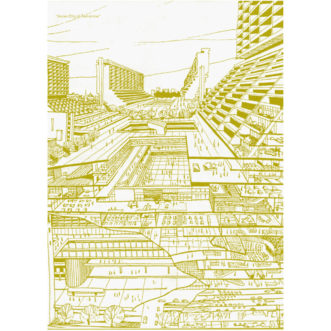
Extended Abstract
Through the past years, human beings always thought they were being the ace of nature. Narcissism leads us to believe that humans have an incredible and exclusive destructive power over natural balances. Even while considering the harm we cause to other living creatures, we continue to perceive ourselves as unique, different, and remarkable. Nonetheless, what we believe is not exactly the same as what we see in reality. This calamitous power is equally distributed among all living things (including bacteria and viruses) which turns out that humans are not primarily nature-changing creatures [Figure I]. As it can be obviously seen today, the appearance of Sars-Cov-2 has not only ended millions of human lives, but it has also led to the death of political life in which we have known and practiced it for generations. At this point, humanity starts to establish a strange experiment of global monasticism in a place where politics is a forbidden and impossible reality.
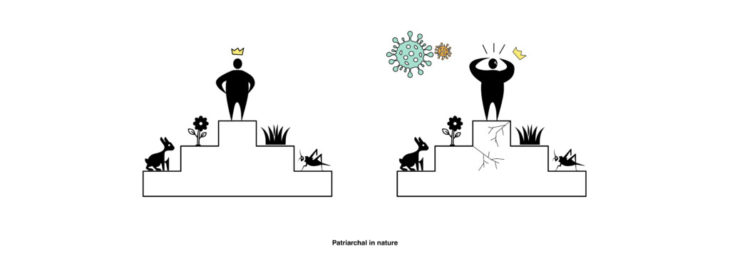
This tends to result in the radicalization of ecological ideas. “Everything has become home”, stated Coccia, can be conveyed that no matter what estate you own and no matter if we are human or non-humans, we all live in the same place. By attempting to find a more ‘ecological’ perception of the earth, we aim automatically to think of it as the home for all of us which has an order that needs to be protected and boundaries that cannot be crossed. In the same way, to think of Earth as a gigantic house faithfully means, considering that all living things other than humans are being under house arrest. They are constantly at home with nowhere else to be. Even humans nowadays also have to respect their ecosystem and are forced to live anachronistically without the freedom to travel anywhere like before. Finally, humans and non-humans are all locked in the house and have no way of being outside.
The meaning of ‘Home’ has become a paradox whether looking at it as a house, desperately settled by things of objects, through its architectural forms and functions [Figure II, III], or looking at it as an abstract space without shells, populated by humans and non-humans, opened and became habitable by objects [Figure IV]. As mentioned by Coccia, from now on, staying at home should simply mean “staying where you give life to everything and everything gives life to you”. He also examined home as a universal kitchen, a kind of shared laboratory in which we attempt to create ourselves, discover the right combination, and manufacture shared bliss. Within a bigger image, the new city could be seen as a massive chemical recipe in which humans strive to create an elixir of life by combining things and themselves with every existing object. Ultimately, envisioning the house and the city as the great kitchens means to get rid of patriarchal relationships and transform them into a space of care, not just in the form of nourishment. This can simply be rendered in the following sentence, “Home is only where there is care for something and someone”.
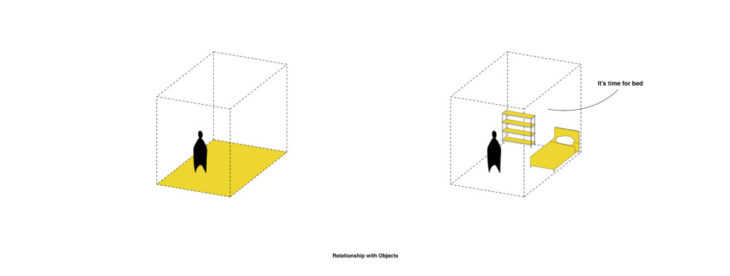
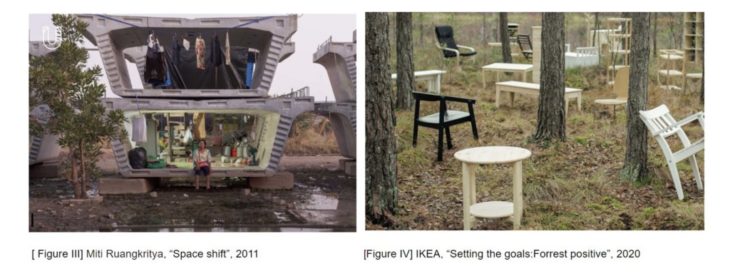
Contemporary ecology continues to rely on the idea that the Earth is the only home for all living beings. The terms of ecology and ecosystem following this concept can be related to the Greek word ‘Oikos’ which refers to the habitation or well-organized household space. However, by taking our position into the arguments, the perception relating to this ecological philosophy, the meaning of “home” can be divided into three different levels: “home as time house”, “home as the neighborhood”, and “home as the planet” [Figure V]. Indeed, nature is not a place of eternal equilibrium where everyone is in their rightful place. It is a place where new living entities are constantly created, causing the entire balance to shift. Therefore, contrary to Coccia, we believe that there is always a way of being outside. Stepping out from our place, perhaps, is the best way to learn how to maintain it [Figure VI].
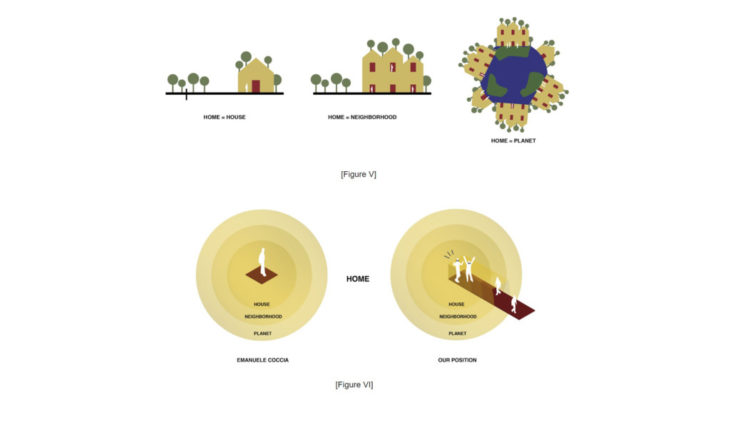 To be clearer, the initial step to comprehend human’s mutual relationship towards other species could start from thinking of being outside the house. People will be able to see a clearer image of their place; not only problematic images inside the house but also the negative impact on the neighborhood. Given an example of a landscape design in Vienna called ’Parc de la Distance’ by Studio Precht, 2020 [Figure VII]. Instead of closing down all the doors like public parks and gardens across the world, this fingerprint-shaped space allows humans to stay outside among greens while respecting the rules of social distancing. Looking further away from the neighborhood scale, people often seek to travel or study abroad. When time passes, conditions change, humans are repeatedly challenged to come up with new solutions for their habitats. Visiting new communities sometimes allows them to obtain and adapt the new knowledge to enhance their society, nature, and public space. Construction techniques and material usage influenced from other countries could be two of the elements that influence exploring the outside home, [Figure VIII].
To be clearer, the initial step to comprehend human’s mutual relationship towards other species could start from thinking of being outside the house. People will be able to see a clearer image of their place; not only problematic images inside the house but also the negative impact on the neighborhood. Given an example of a landscape design in Vienna called ’Parc de la Distance’ by Studio Precht, 2020 [Figure VII]. Instead of closing down all the doors like public parks and gardens across the world, this fingerprint-shaped space allows humans to stay outside among greens while respecting the rules of social distancing. Looking further away from the neighborhood scale, people often seek to travel or study abroad. When time passes, conditions change, humans are repeatedly challenged to come up with new solutions for their habitats. Visiting new communities sometimes allows them to obtain and adapt the new knowledge to enhance their society, nature, and public space. Construction techniques and material usage influenced from other countries could be two of the elements that influence exploring the outside home, [Figure VIII].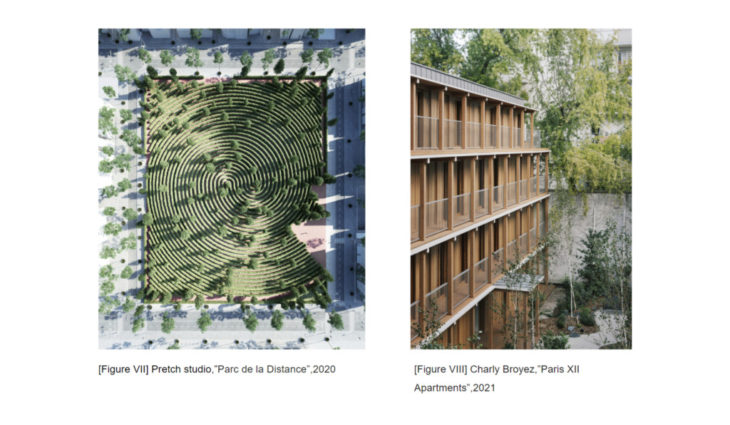 Visualizing out of the global scale, for a decade, science has proved that humans can be outside the world. Even in sci-fi movies, they regularly show some possibilities to survive on other planets [Figure IX]. This can be interpreted that humans never stop trying to find a way of being outside. To summarize, by thinking ecologically regarding the book, we strongly agree with Coccia that humans have to treat and take care of the earth as our home. Nonetheless, to change the mindset of permanently staying at home for everyone is impossible for us. Post-pandemic design solutions are the criteria showing that most people no longer stay at home [Figure X]. Always having the perception of being outside, could somehow lead to unlocking a better perspective and solution for preserving our home’s ecosystem. If Coccia tried to find a great recipe inside the kitchen, we would try to find a new recipe from a restaurant outside the home of the planet.
Visualizing out of the global scale, for a decade, science has proved that humans can be outside the world. Even in sci-fi movies, they regularly show some possibilities to survive on other planets [Figure IX]. This can be interpreted that humans never stop trying to find a way of being outside. To summarize, by thinking ecologically regarding the book, we strongly agree with Coccia that humans have to treat and take care of the earth as our home. Nonetheless, to change the mindset of permanently staying at home for everyone is impossible for us. Post-pandemic design solutions are the criteria showing that most people no longer stay at home [Figure X]. Always having the perception of being outside, could somehow lead to unlocking a better perspective and solution for preserving our home’s ecosystem. If Coccia tried to find a great recipe inside the kitchen, we would try to find a new recipe from a restaurant outside the home of the planet. 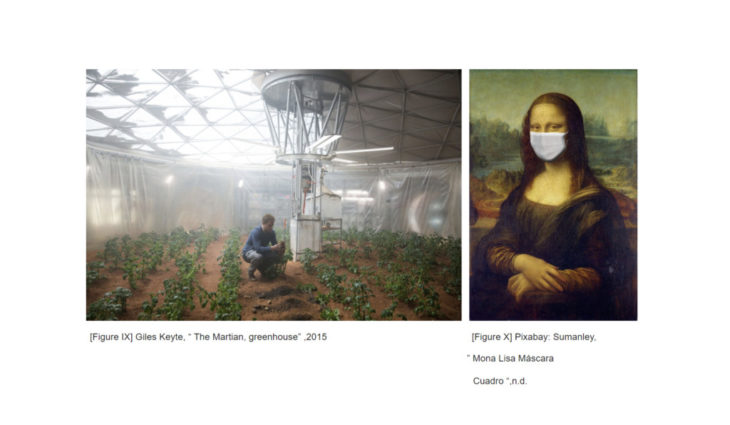
List of References
- Emanuele Coccia: “el virus es una fuerza anárquica de metamorfosis”. la Vorágine. (2020, March 29). Retrieved November 15, 2021, from
https://lavoragine.net/virus-fuerza-metamorfosis-emanuele-coccia/.
- Coccia, E. (2020, April 21). Emanuele Coccia / reversing the new global monasticism. Fall semester. Retrieved November 15, 2021, from
https://fallsemester.org/2020-1/2020/4/17/emanuele-coccia-escaping-the-global-monasticism.
- Harrouk, C. (2020, April 17). Studio Precht imagines a park for physical distancing during the coronavirus pandemic. ArchDaily. Retrieved November 21, 2021, from
https://www.archdaily.com/937801/studio-precht-imagines-a-park-for-physical-distancing-during-the-coronavirus-pandemic.
This document is a project of IAAC, the Institute for Advanced Architecture of Catalonia, developed in the Master in Advanced Ecological Buildings and Biocities (MABB01) 2021/22 by students: Suwapat Rodprasert & Pongpol Punjawaytegul; faculty: Jordi Vivaldi